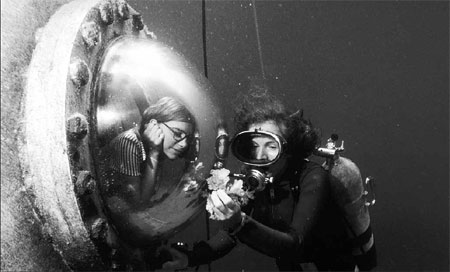In the swim
Updated: 2013-06-16 07:38
By Gan Tian(China Daily)
|
|||||||
|
Sylvia Earle (right) says the ocean is a living system in which every drop of water is filled with life. Bates Littlehales / National Geographic |

Ocean explorer absorbs knowledge with all of her senses, she tells Gan Tian.
The Titanic director James Cameron once said he feels complete silence under the water, but renowned oceanographer Sylvia Earle has a different take. Invited by high-end cosmetic brand La Mer, the aquanaut from the United States came to Beijing to unveil a video about her diving experiences and her views about the ocean.
"The ocean is filled with sound. When you are in the submarine, as James was when he went to the deepest place a year ago, you are isolated from sounds outside," she says. "But if you dive, like me, you will find out that all kinds of fish make sounds.
"There are fish known as grunts that make grunt sounds, there are croakers that make croak sounds, and groupers that make 'mmm, mmm' deep sounds like that. Some sounds are like electronic sounds 'weeee, weeee' ... all marine mammals, all whales, all dolphins, all seals, all sea lions, all lobsters ... they are very noisy creatures," says the National Geographic explorer-in-residence.
The 78-year-old is still glamorous and elegant. Dressed in an ocean-blue velvet suit, she imitates different sounds and acts out marine animals behavior as she was sharing her experiences.
"My mother was 81 years old when she began diving. She would tell you, don't wait until you are 81, because it's easier when you start when you are young," Earle says. "But if you can get into a car or an airplane, you can get into a submarine and go exploring."
The ocean got Earle's attention when she was 3 years old. She was knocked over by a wave on the New Jersey shore and discovered there are amazing creatures who live in the water: horseshoe crabs, starfish and more. Earle describes them as "past, present and future life on Earth".
"As a child, I loved exploring the ocean because I knew that no matter how often I looked, I would always find new and unexpected discoveries. That is true, today, as well," she says.
"But now the importance of the ocean as the cornerstone of Earth's life support system inspires great respect and a sense of urgency about taking care of it as if our lives depend on it - because they do."
On World Oceans Day, which fell on June 8, Earle called for more attention to the ocean and sea and its ecosystem.
"The ocean was in trouble because of what we put into and took out of it. It started happening mostly in the middle of 20th century," she says.
This is Earle's fifth trip to China. The first time she was here was in 1973. After more than two decades, the oceanographer finally got a chance to dive in the South China Sea last October.
"This was in a place close to where people are active ... If I had been diving in the same place 50 years ago, it would be much healthier.
But the human influence has also been positive. We have learned more about the ocean, and that is the good news, according to Earle.
" More people began to understand the ocean is alive. It is not just sand, fish and water. It's a living system in which every drop of water is filled with lives," she says.
The ocean heroine has led more than 100 expeditions and logged more than 7,000 hours underwater. Now she focuses on marine ecosystem exploration and conservation. At present, she is developing a global network of areas on the land and in the ocean, named "Hope Spots", to safeguard the living systems.
"Make people aware - that's where everything starts. At the same time, some funds are being raised, for example, to teach fishermen alternative ways to earn from the ocean without killing the fish," she says.
There's a new trend in tourism that attracts people to see whale, or swim with sharks.
"It's all around the world. The idea of paying to see healthy and living whales, or fish underwater, is economy-driven. It's just like beautiful places in the land attract people to come and enjoy," she says.
In Earle's opinion, China has a smart aqua culture that has great potential in ocean protection. The country has thousands of years of experience in growing fish in small areas, and growing ducks, plants and fish together.
When she was in Hainan province last October, she noticed that mangrove marshes are being restored because salt marshes are very important in protecting the coast. They absorb carbon dioxide, and hold up the shoreline.
"The next 10 years will be very important for the next 1,000 years, because we have chance to use the power of knowing to restore the ocean. We need to respect and protect the ocean," she says.
Watch the video at wod.lamer.com.cn.
Contact the writer at gantian@chinadaily.com.cn.
(China Daily 06/16/2013 page4)
